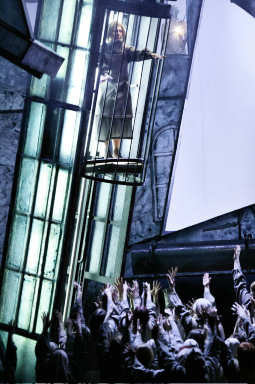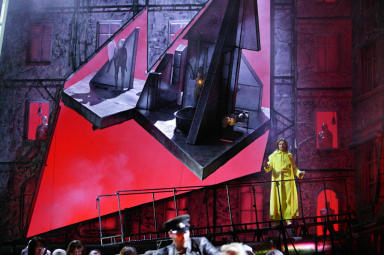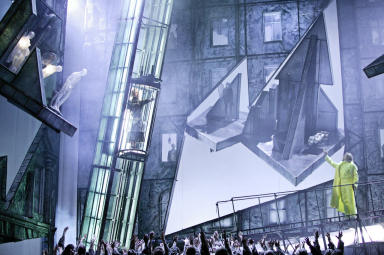|
Editorial Board
Melanie
Eskenazi
Webmaster: Len Mullenger
|
Seen and Heard Opera Review
Prokofiev: The Fiery Angel: (Production UK Premiere) Soloists / Bolshoi Opera / Alexander Vedernikov (conductor). Royal Opera House, Covent Garden. 25.07.2006 (ED)
Culturally speaking, things Russian are omnipresent in the UK right now: Kandinsky is at the Tate, Shostakovich two-times it between the Coliseum and the Proms, as does Prokofiev between Glyndebourne and Covent Garden with a pair of important UK Premieres. Too much of a good thing? Never!
The Bolshoiís visit coincides with that of Gergievís Mariinsky team, but the Muscovites donít seem flustered by the mega-maestro making London his second home, for they have brought two impressive productions, one old and one new. Their Boris Godunov might almost predate time but it is their defining production from an era long gone. Zambelloís staging of The Fiery Angel could well be their defining production of the 21st century; itís already something of an instant classic in Russian operatic circles.
Prokofievís synthesis of music with his own
libretto created of itself the possibility for The
Fiery Angel to be the most powerful of his stage creations.
Certainly no other contains the ingredients that allow
both dominant sides of his personality to hold sway in
combination and confrontation with each other. Lyricism
tussles with brutish almost self-destructive urges and
although Prokofiev could be a precise orchestrator when
he wanted to be, that was not ultimately where his natural
inclination lay.
It is a point brought home with some force in this production. Francesca Zambello pulls few punches with her direction; like a surgeon dissecting a body she carefully reveals the sinews under the skin of her patient. And what a fascinating patient The Fiery Angel is! It would be all too simple to label it a twisted vision, but it is much more at a far deeper level: a reflection of the human psyche that by being hard to stomach has comment to make on what it means to be Ďcivilisedí. The opera draws out the forced opposition that civilisation has made between mysticism and absolute science. Renataís quest to find the Fiery Angel is her search for absolute knowledge, but it can only be satisfied via mystical routes.
George Tsypinís dark, mysterious and multi-faceted set lent some precision of location to the action, but also allowed some mystery to remain in the mind and eye of the spectator. Silhouetted projections of dancers onto the set facades to evoke Renataís demonic apparitions suggested something not entirely of this world. The same applied to Mephistopheles eating the young boy in the local tavern. Humour and caricature put the action beyond the normal. Colour too played its distinctive role: Madiel, the Fiery Angel, appears dressed in a luminous yellow suit that states more eloquently than words, his separation from reality.
Character was brought out in most of the smaller roles by the cast members, all of whom turned in committed performances. Evgenia Segenyukís Fortune Teller was outstanding; here is a singer with a dark and rich contralto of a quality almost non-existent today. Elena Novakís Mother Superior was impassioned and Alexander Krutyakovís Count Heinrich suitably dismissive and arrogant. Of the few that were notably under-resourced vocally for their roles, the most crucial was Vadim Lynkovsky as the Grand Inquisitor. Gergievís recording of the work stands to show how much more gripping a finale is made by having an imposing singer in that role.
No such qualms were to be had about Boris Statsenkoís Ruprecht or Tatiana Smirnovaís Renata. Their characters are almost as one in terms of fate, and even if Statsenko captured the growing disillusionment of Ruprechtís companionship with Renata, Smirnova was more impressive. Committed emotionally, vocally and in terms of acting she charted Renataís destructive obsessions in a searing arc from the first scene to the last. This Renata overcame her fear of demons to confront them head-on, and in her madness strangely surpass them in powers that are beyond the human.
But rightly enough it is the totality of Prokofievís creation that stays longest in the mind from this performance, and that in no small measure was due to the quality of the Bolshoi orchestra. Under Alexander Vedernikovís committed and fearless direction the orchestra showed at times its willingness to forego sheer tonal beauty in preference to force of expression. Every instrumental department excelled itself at some point in the range of nuanced articulation they produced to match the scoreís often required white-hot intensity. Two illustrations bear mention: the violas carried a rare hollowness still not often heard in Western orchestras, whilst the lower winds were peculiar in their sweet-edged raspiness.
Programming but two performances seems a touch mean. No doubt the tourís organiser thought that the classic Boris Godunov would draw a bigger crowd. Hopefully the Bolshoi will visit again before long and this Fiery Angel will come with them. If it does, I urge you to see it.
|
| ||
|
||||





